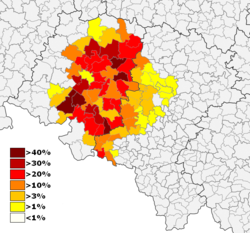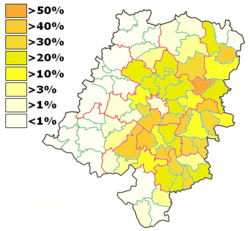- German Minority (political party)
-
German Minority
Polish: Mniejszość Niemiecka
German: Deutsche MinderheitHeadquarters ul. M.Konopnickiej 6
45-004 Opole
ul. Wczasowa 3
47-400 RacibórzIdeology Liberalism, Minority politics Political position Center Sejm 
Website http://www.mniejszoscniemiecka.eu Politics of Poland
Political parties
Elections German Minority in the Polish part of Upper Silesia (Opole Voivodeship and Silesian Voivodeship).
German Minority in the Polish part of Upper Silesia (Opole Voivodeship and Silesian Voivodeship).
German Minority (Polish: Mniejszość Niemiecka, German: Deutsche Minderheit) is a political party of the German minority in Poland, in the mainly Polish part of Silesia. It is the political arm of the Social-Cultural Association of Germans in Silesian Opole (Towarzystwo Społeczno-Kulturalne Niemców na Śląsku Opolskim) and Social-Cultural Association of Germans in Silesian Voivodeship (Towarzystwo Społeczno-Kulturalne Niemców Województwa Śląskiego).[1]
Its popularity has been declining since its establishment in 1990.
Contents
Program
German Minority supports Polish integration with the European Union and the development of the region of Silesia, and argues for laws supportive of minority groups (in particular, the German minority in Poland). German Minority prefers to refer to itself as an electoral committee and non-partisan representatives of the local population, instead of a political party.
National elections
As a party of a national minority, it is not required to pass the election threshold of 5% as standard political parties in Poland are.
National elections:
election votes % seats 1991 Parliamentary elections 132,059 1.18 % 7 1993 Parliamentary elections 60,770 (+ 23,396) 0.44 % (+ 0.17 %) 3 (+ 1) 1997 Parliamentary elections 51,027 0.39 % 2 2001 Parliamentary elections 47,230 0.36 % 2 2005 Parliamentary elections 34,469 0.29 % 2 2007 Parliamentary elections 32,462 0.20 % 1 2011 Parliamentary elections 28,014 0.19% 1 In 1993 there were two lists, one in the Opole Voivodeship, one in the Katowice Voivodeship. The Opole list also won one seat in the Senate.
At the 2007 Parliamentary elections the candidate list to the Sejm (Polish parliament) got 8.81% of the votes in Opole Voivodeship, and only one seat in the Sejm, Ryszard Galla (8,193 votes). He had already won a seat in 2005 and had announced the rise from 2 to 3 seats as an electoral goal early in September, thanks to the personal votes of local mayors who were supposed to reinforce the list.[2][3] The second former Sejm deputy, Henryk Kroll (7,897 votes), lost his seat and announced his resignation from the chairmanship of the Social-Cultural Association of Germans in Silesian Opole, whose delegates are due to elect a new president early 2008. The 3 candidate list for the Senate of Poland didn't succeed in winning a single seat. According to the bilingual weekly Schlesisches Wochenblatt, votes won by the German Minority list could have benefited the Civic Platform (PO), for whom 6,000 to 8,000 ethnic Germans would have voted.[4]
In 2011 the list got 8.76% of valid votes in the Opole constituency, and more than 20% in 3 powiat (Krapkowice County, Opole County and Strzelce County) out of 12. Ryszard Galla was reelected as the sole MP from the German Minority with 11,794 personal votes.[5][6]
Regional elections
Local elections to the Opole Regional Assembly:
Year Votes % Seats 1998 ? ? 13 2002 54,385 18.61 7 2006 49,131 17.30 7 2010 53,670 17.77 6 References
- ^ http://www.dfkschlesien.vdg.pl/
- ^ Kampf um drei Sejm-Mandate, Schlesisches Wochenblatt 12/09/2007
- ^ Engelbert Miś, 21 Kandidaten für den Sejm, 3 für den Senat, Schlesisches Wochenblatt 19/09/2007
- ^ Nur Ryszard Galla bleibt im Sejm, Schlesisches Wochenblatt 24/10/2007
- ^ Election results »Poland»Sejm constituency no. 21, National Electoral Commission
- ^ Komitet Wyborczy Wyborców Mniejszość Niemiecka, National Electoral Commission
Bibliography
- Cordell, Karl (1999), "The Germans of Opole Silesia and the Reform of Regional and Local Government in Poland", European Consortium for Political Research - Joint Sessions, Mannheim, 1999
- Cordell, Karl & Born, Karl Martin (2000 DS), "Die deutsche Minderheit in Schlesien: von der Interessenvertretung zur politischen Partei", Deutsche Studien, 36, 3/4, 2000, pp. 321–335
- Born, Karl Martin & Cordell, Karl (2000 DDPN), "Perspektiven: Thesen zur politischen Zukunft der deutschen Minderheit", Dialog. Deutsch-Polnisches Magazin, 13, 2000, pp. 56–59.
- Cordell, Karl & Born, Karl Martin (2001 NEP), "The German Minority in Upper Silesia: Electoral Successes and Organizational Patterns", Nationalism and Ethnic Politics, 7, 1, 2001, pp. 41–61.
- Cordell, Karl & Born, Karl Martin (2001 EEPS), "The Strategy of the German List at the Polish Local and Regional Elections of 1998", East European Politics and Societies, 15, 3, 2001, pp. 625–648.
- Rabagliati, Alastair (2001). A Minority Vote. Participation of the German and Belarusian Minorities within the Polish Political System 1989-1999. Kraków: Zakład Wydawniczy NOMOS. ISBN 83-88508-18-0.
External links
Categories:- Political parties established in 1990
- Political parties in Poland
- Political parties of minorities
Wikimedia Foundation. 2010.

